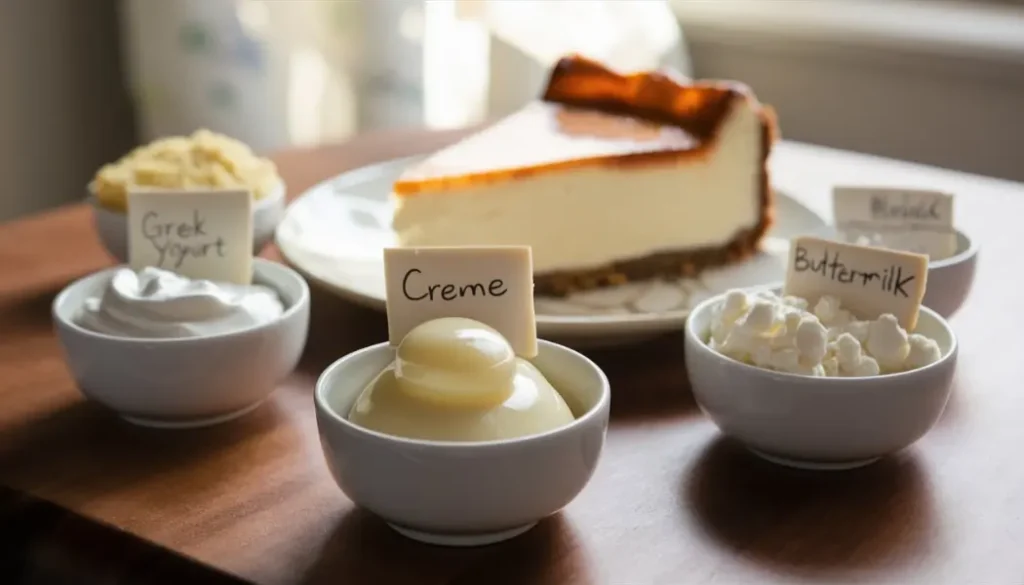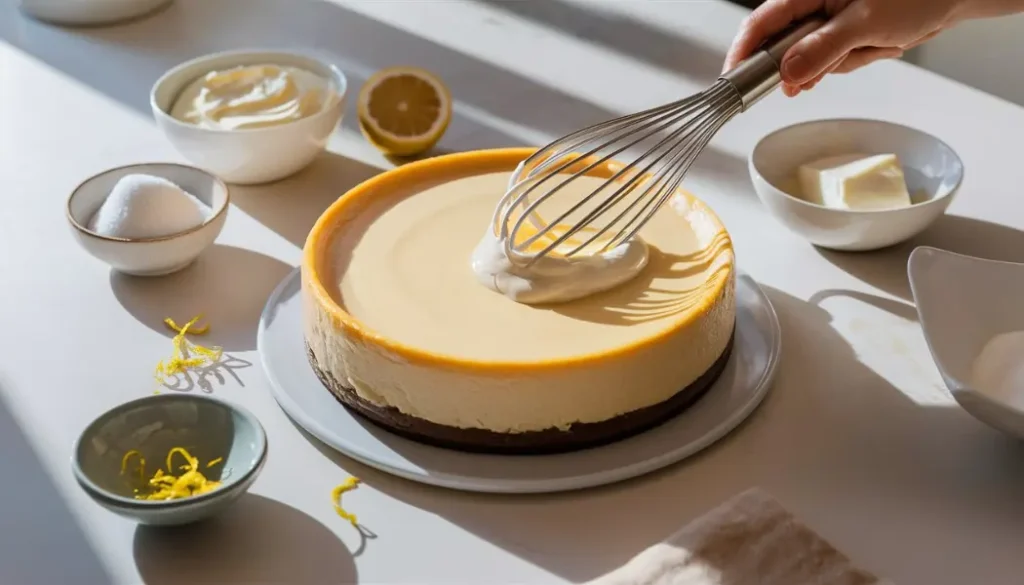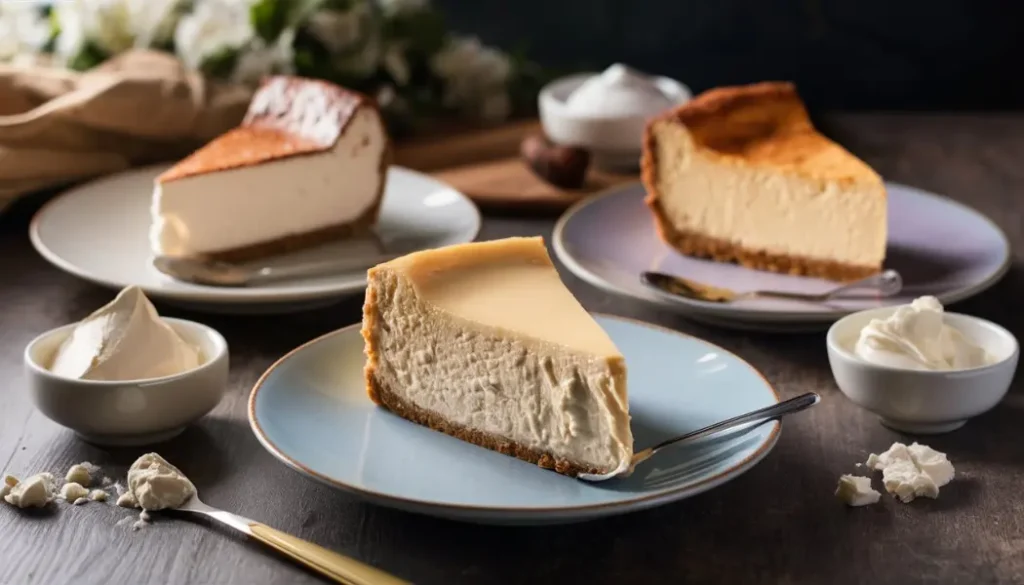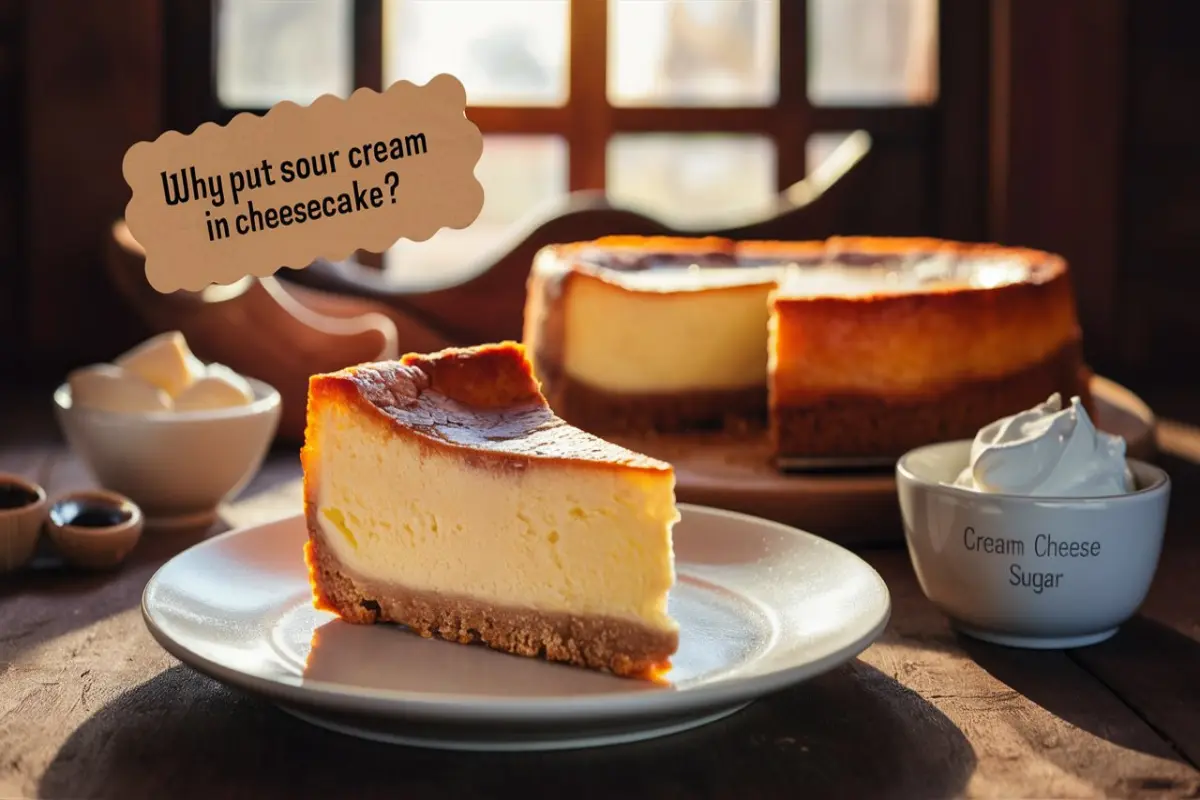Cheesecake is a beloved dessert, known for its rich, creamy texture and balanced sweetness. One of the key ingredients in many cheesecake recipes is sour cream. You might wonder, why put sour cream in cheesecake? Is it necessary, or can you skip it?
In this article, we’ll explore the role of sour cream in cheesecake and why it’s a popular choice for bakers. From improving texture and flavor to the science behind how it interacts with other ingredients, you’ll learn everything you need to know about why sour cream deserves a spot in your cheesecake recipe.
The Role of Sour Cream in Cheesecake
Sour cream plays a critical role in achieving the smooth, creamy texture that cheesecakes are known for. Its unique composition of fat and water helps create a soft, velvety consistency without making the cake too dense. When mixed with cream cheese, sour cream helps to thin out the batter just enough to allow the cheesecake to set with a silky texture, rather than being overly firm or heavy.
The richness of sour cream is another reason it’s a favorite in cheesecake recipes. Its high-fat content adds to the luxurious mouthfeel of the dessert, making each bite melt in your mouth. Unlike milk or cream, which can make the batter too thin or watery, sour cream strikes the perfect balance.
Additionally, sour cream works to keep the cheesecake moist. Cheesecake can sometimes crack or dry out during baking, but sour cream helps prevent this by retaining moisture in the batter. This results in a cheesecake that is not only creamy but also holds together beautifully when sliced.
Without sour cream, cheesecakes can be dense and overly thick. By adding sour cream, you ensure a lighter, smoother texture that enhances the overall dessert experience.
How Sour Cream Balances the Flavor
One of the most important contributions sour cream makes to cheesecake is its ability to balance flavors. Cheesecake is a rich and often sweet dessert, but without the right balance of tangy and acidic notes, it can become overwhelmingly sweet. That’s where sour cream comes in.
Sour cream adds a slight tanginess that cuts through the richness of the cream cheese and the sweetness of the sugar. This tang provides a refreshing contrast, keeping the flavor profile from becoming one-dimensional. The acidity in sour cream is particularly effective at enhancing other flavors in the cheesecake, including vanilla, lemon, or even chocolate, depending on the recipe.
Moreover, sour cream’s tangy flavor complements the naturally sweet and slightly tart taste of cream cheese. Together, they create a well-rounded dessert that pleases the palate without feeling too heavy. This subtle tang doesn’t overpower the cheesecake but rather works in harmony with the sweetness, creating a more complex and enjoyable flavor experience.
Sour cream’s acidity also affects the way we perceive sweetness. It softens the intensity of the sugar, making the overall flavor of the cheesecake smoother and more balanced. The result is a dessert that doesn’t leave an overwhelming sugary aftertaste but instead has a clean, refreshing finish.
In summary, sour cream is a key player in making cheesecake not only rich and creamy but also balanced in flavor. Its tangy notes elevate the dessert, ensuring that each bite is deliciously complex without being overly sweet or rich.
The Science Behind Sour Cream in Cheesecake
To understand why sour cream is so effective in cheesecake, we need to look at the science behind it. Sour cream is composed of fat, water, and lactic acid, and each of these elements plays a unique role in the baking process.
Fat Content and Creaminess
First, the fat content in sour cream contributes to the overall richness and creamy texture of the cheesecake. Sour cream typically contains around 18-20% fat, which is enough to add a silky smoothness without making the batter too dense. The fat in sour cream works with the cream cheese to create a luxurious, melt-in-your-mouth texture that’s a hallmark of a well-made cheesecake.
The fat in sour cream also helps stabilize the batter. During baking, fat molecules surround water and protein molecules, preventing them from clumping together. This ensures that the cheesecake maintains its smooth texture as it bakes, rather than becoming grainy or curdled.
Acidity and Tanginess
Next, the acidity in sour cream is key to its role in balancing flavors. Sour cream has a pH level of about 4.5, which makes it slightly acidic. This acidity not only provides the tangy flavor but also has a significant impact on the baking chemistry. The acid interacts with the proteins in the cream cheese and eggs, preventing them from setting too quickly or becoming overly firm. As a result, the cheesecake bakes evenly and remains creamy, without developing a dense or rubbery texture.
Additionally, the acid in sour cream helps to soften gluten in the flour (if used in the recipe), ensuring a tender texture. This is especially important in cheesecake crusts, where a delicate crumb is desired.
Moisture Retention
Sour cream’s water content, typically around 60%, also plays a crucial role in preventing the cheesecake from drying out. As the cheesecake bakes, the water in the sour cream evaporates slowly, helping to keep the dessert moist throughout the baking process. This reduces the risk of cracks forming on the surface and ensures a smooth, creamy final product.
Interaction with Other Ingredients
Finally, sour cream works in tandem with the other ingredients in the cheesecake. It blends seamlessly with cream cheese and eggs, helping to create a unified, stable batter. The lactic acid in sour cream can also enhance the flavors of other ingredients, like vanilla extract or lemon zest, making them more pronounced.
In conclusion, sour cream’s fat, acidity, and water content all contribute to making cheesecake smoother, creamier, and more balanced. Its role in stabilizing the batter and balancing flavors makes it an indispensable ingredient for creating the perfect cheesecake.
Substitutes for Sour Cream in Cheesecake

If you’re making cheesecake and find yourself without sour cream, don’t worry—there are several substitutes that can achieve similar results. Each substitute has its own texture and flavor profile, so it’s important to choose one that fits your preferences and dietary needs.
1. Greek Yogurt
Greek yogurt is one of the best substitutes for sour cream in cheesecake. It has a similar tangy flavor and thick consistency, making it a great replacement in equal amounts. The added benefit of Greek yogurt is its high protein content and lower fat levels, which can make your cheesecake slightly healthier. However, it may produce a slightly less rich texture compared to sour cream.
2. Crème Fraîche
For a closer match to the texture and richness of sour cream, consider using crème fraîche. Like sour cream, crème fraîche is thick, creamy, and tangy, but it has a higher fat content, which can make the cheesecake even creamier. Use the same amount of crème fraîche as you would sour cream for a luxurious dessert.
3. Buttermilk
If you don’t have thick substitutes like Greek yogurt or crème fraîche on hand, buttermilk can work in a pinch. Buttermilk is much thinner than sour cream, so you’ll need to reduce the amount used and possibly add a thickening agent like flour. It adds the tangy flavor but won’t provide the same creamy texture.
4. Cream Cheese
In some cases, you can replace sour cream with additional cream cheese. This will make the cheesecake denser and richer, as cream cheese has a higher fat content and thicker texture than sour cream. However, it may reduce the tangy flavor that sour cream adds.
5. Cottage Cheese
Another alternative is cottage cheese, blended until smooth. While it doesn’t have the same tanginess as sour cream, it can provide the creaminess needed for the cheesecake batter. You might want to add a teaspoon of lemon juice to mimic the tang of sour cream.
When substituting, keep in mind that the texture and flavor of your cheesecake may vary slightly. Greek yogurt and crème fraîche are the closest in taste and consistency, but with a little creativity, you can still achieve a delicious cheesecake without sour cream.
Tips for Using Sour Cream in Cheesecake

Using sour cream in cheesecake is straightforward, but there are a few tips to ensure the best results:
1. Use Full-Fat Sour Cream
When baking a cheesecake, always opt for full-fat sour cream. The extra fat enhances the texture, making the cheesecake creamier and more indulgent. Using low-fat or fat-free versions can affect the richness of the dessert and may lead to a less satisfying result.
2. Bring Sour Cream to Room Temperature
Before adding sour cream to your cheesecake batter, allow it to come to room temperature. Cold ingredients can cause the batter to curdle or not blend properly, leading to a lumpy texture. By letting sour cream sit out for about 30 minutes before mixing, you’ll achieve a smoother batter and ensure even baking.
3. Add Sour Cream Last
When making your cheesecake batter, add the sour cream last. After combining the cream cheese, eggs, and sugar, gently fold in the sour cream. This prevents overmixing, which can cause the cheesecake to become too dense. Sour cream should be incorporated delicately to maintain the light, airy texture.
4. Avoid Overmixing
While it’s tempting to blend everything thoroughly, overmixing can lead to cracks in the cheesecake as it bakes. Sour cream is a delicate ingredient, and too much stirring can introduce excess air into the batter, causing it to rise and fall unevenly. To avoid this, mix the batter just until everything is combined.
5. Adjust for Sour Cream Substitutes
If you’re using a substitute for sour cream, like Greek yogurt or crème fraîche, keep in mind that the texture may change slightly. You might need to adjust the baking time or reduce other liquids in the recipe to accommodate the differences in thickness and moisture content.
By following these tips, you’ll ensure that your sour cream cheesecake comes out creamy, smooth, and perfectly textured every time.
Sour Cream in Different Types of Cheesecake

Sour cream is a versatile ingredient that works well in various types of cheesecakes. However, how it is used can vary depending on the style of cheesecake you’re making.
1. New York-Style Cheesecake
In New York-style cheesecake, sour cream is a key ingredient. This type of cheesecake is known for its dense, rich texture, and sour cream helps achieve that balance between creaminess and firmness. It’s often added to the batter to give the cake its signature tang, but some recipes call for sour cream as a topping instead. The tanginess of the sour cream enhances the rich flavors of the cream cheese and provides a slightly lighter finish to each bite.
2. No-Bake Cheesecake
In no-bake cheesecakes, sour cream can be used to add creaminess without baking. Since this type of cheesecake doesn’t rely on heat to set, sour cream helps maintain a smooth texture while giving the dessert a slight tang. However, in no-bake recipes, the role of sour cream is typically more subtle compared to its presence in baked cheesecakes.
3. Baked Cheesecake with a Sour Cream Topping
Some cheesecakes feature a sour cream topping. This topping is added after the cheesecake has baked, and it adds a smooth, glossy finish. To make the topping, simply mix sour cream with a little sugar and vanilla, then spread it over the baked cheesecake and return it to the oven for a brief second bake. This method adds an extra layer of flavor and texture, providing contrast to the dense, rich base.
4. Cheesecake Bars and Mini Cheesecakes
Sour cream isn’t just for full-sized cheesecakes. It’s also frequently used in cheesecake bars and mini cheesecakes. In these smaller desserts, sour cream helps retain moisture and keeps the texture soft and creamy, even in a smaller portion.
Regardless of the type of cheesecake, sour cream remains a valuable ingredient that improves both the texture and flavor of the dessert.
FAQ
Can I make cheesecake without sour cream?
Yes, you can make cheesecake without sour cream, but the texture and flavor will be different. Sour cream adds creaminess and a tangy flavor, which helps balance the sweetness of the cheesecake. If you don’t have sour cream, you can substitute it with alternatives like Greek yogurt or crème fraîche, which provide similar tang and texture.
What can I use instead of sour cream in cheesecake?
There are several substitutes for sour cream in cheesecake, depending on what you have available:
- Greek yogurt: Offers a similar tangy flavor and creamy texture.
- Crème fraîche: A thicker, richer substitute that will make the cheesecake even creamier.
- Buttermilk: Adds tang, but since it’s thinner, you may need to adjust the consistency.
- Cottage cheese (blended): Works in a pinch but may alter the texture slightly.
Each substitute will affect the flavor and texture, so choose one based on your desired outcome.
Does sour cream make cheesecake creamier?
Yes, sour cream contributes to the creamy texture of cheesecake. Its fat content and acidity help create a smooth, rich consistency, which makes each bite soft and silky. The sour cream also helps to balance the density of the cream cheese, resulting in a more tender and velvety cheesecake.
Should I use full-fat or light sour cream in cheesecake?
It’s best to use full-fat sour cream when making cheesecake. Full-fat sour cream adds richness and contributes to the creamy texture of the cheesecake. Using light or fat-free sour cream will result in a less rich dessert, and may affect the final texture, making it less smooth.
Can sour cream affect the baking time?
Yes, the moisture content in sour cream can affect the baking time of your cheesecake. Since sour cream adds moisture to the batter, it might take a little longer for the cheesecake to set fully. Be sure to check for doneness by gently shaking the cheesecake—only the center should jiggle slightly. If the entire cheesecake wobbles, it needs more time in the oven.
Conclusion
So, why put sour cream in cheesecake? Sour cream enhances the texture, flavor, and overall quality of the cheesecake, making it a key ingredient in many recipes. It adds a creamy, smooth texture while balancing the sweetness with a slight tanginess. Plus, the fat and moisture content in sour cream help prevent the cheesecake from cracking or drying out during baking.
Whether you’re making a traditional New York-style cheesecake, a no-bake version, or mini cheesecakes, sour cream plays an important role in delivering a delicious dessert. And if you don’t have sour cream on hand, substitutes like Greek yogurt or crème fraîche can still give you great results.
With these insights, you can confidently incorporate sour cream into your next cheesecake recipe, knowing that it will enhance both the texture and flavor of your dessert.
